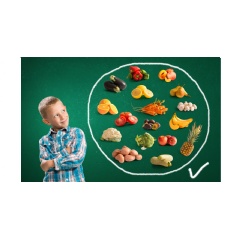A brief pilot intervention enhances preschoolers’ self-regulation and food liking
Children who received intervention experienced significant improvements in behavioral regulation and liking of fruits and vegetables, according to a new study in the Journal of Nutrition Education and Behavior
Mindfulness training and engaging in classroom-based games can influence self-regulation and food liking when introduced during the preschool years according to a new study in the Journal of Nutrition Education and Behavior, published by Elsevier.
“For this study, we were interested in developing and evaluating a brief five-week intervention that incorporated best practices for supporting two important indicators for children’s development: self-regulation and food liking, particularly liking fruits and vegetables,” said Sara A. Schmitt, PhD, Department of Human Development and Family Studies, Purdue University, West Lafayette, IN, USA. “As part of the intervention we were focused on mindfulness activities and classroom-based games, and all the activities had embedded exposure to fruits and vegetables. We also included sensory learning techniques like tastings throughout many of the sessions.”
After developing the intervention, researchers from Purdue University, Central Michigan University and Yale University assessed 39 children from two Head Start centers serving children from low-income families. Children from one center received the intervention while children in a second center did not. All children were assessed on self-regulation skills and liking of fruits and vegetables pre- and postintervention.
“What we found was that children who participated in the intervention experienced significant gains in their behavioral regulation and in their liking of fruits and vegetables from pre- to postintervention. Children in the comparison group who did not receive the intervention did not achieve similar gains in those skills. What this tells us is that there is promise in this intervention in terms of improving our targeted outcomes,” commented Dr. Schmitt.
-----
The article is “Pilot Intervention Enhances Preschoolers’ Self-Regulation and Food Liking,” by Sara A. Schmitt, PhD; Frank Snyder, PhD; Irem Korucu, PhD; Lindsey M. Bryant, BS; and Jennifer K. Finders, PhD (https://doi.org/10.1016/j.jneb.2020.08.008). It appears in the Journal of Nutrition Education and Behavior, volume 52, issue 11 (November 2020), published by Elsevier.
Full text of the article is available to credentialed journalists upon request. To schedule an interview with the author(s), please contact Sara A. Schmitt, PhD at saschmitt@gmail.com.
An audio podcast featuring an interview with Sara Schmitt and other information for journalists are available at www.jneb.org/content/media. Excerpts from the podcast may be reproduced by the media with permission from Eileen Leahy.
About the Journal of Nutrition Education and Behavior (JNEB)
The Journal of Nutrition Education and Behavior (JNEB), the official journal of the Society for Nutrition Education and Behavior (SNEB), is a refereed, scientific periodical that serves as a resource for all professionals with an interest in nutrition education and dietary/physical activity behaviors. The purpose of JNEB is to document and disseminate original research, emerging issues, and practices relevant to nutrition education and behavior worldwide and to promote healthy, sustainable food choices. It supports the society’s efforts to disseminate innovative nutrition education strategies, and communicate information on food, nutrition, and health issues to students, professionals, policy makers, targeted audiences, and the public.
The Journal of Nutrition Education and Behavior features articles that provide new insights and useful findings related to nutrition education research, practice, and policy. The content areas of JNEB reflect the diverse interests of health, nutrition, education, Cooperative Extension, and other professionals working in areas related to nutrition education and behavior. As the Society’s official journal, JNEB also includes occasional policy statements, issue perspectives, and member communications. www.jneb.org
About Elsevier
Elsevier is a global information analytics business that helps scientists and clinicians to find new answers, reshape human knowledge, and tackle the most urgent human crises. For 140 years, we have partnered with the research world to curate and verify scientific knowledge. Today, we’re committed to bringing that rigor to a new generation of platforms. Elsevier provides digital solutions and tools in the areas of strategic research management, R&D performance, clinical decision support, and professional education; including ScienceDirect, Scopus, SciVal, ClinicalKey and Sherpath. Elsevier publishes over 2,500 digitized journals, including The Lancet and Cell, 39,000 e-book titles and many iconic reference works, including Gray’s Anatomy. Elsevier is part of RELX, a global provider of information-based analytics and decision tools for professional and business customers. www.elsevier.com
( Press Release Image: https://photos.webwire.com/prmedia/6/266278/266278-1.jpg )
WebWireID266278
This news content was configured by WebWire editorial staff. Linking is permitted.
News Release Distribution and Press Release Distribution Services Provided by WebWire.
